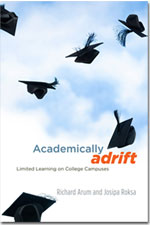Obviously the headlines Academically Adrift has generated concern the findings themselves, the rather depressing portrayal of undergraduate student learning and experience. Even though some might debate aspects of the work (e.g. issues regarding the CLA), few if any would say that the overall portrayal is inaccurate.
Read more ›CURRENT ARTICLE • March 14
OTHER RECENT ARTICLES
I am standing in the door of my office at the end of the semester, looking at the piles of paper stacked on the desk, on the filing cabinets, and on the floor. I realize that I need to make some changes to support an e-learning environment and be more ecologically responsible. With student learning outcomes in mind, I try to envision what this new learning space would look like and what it would mean for me and my students.
Read More ›Keeping college students off social media sites and focused on the course material is a daily challenge for many of today’s college faculty. But what if you could harness the power of today’s technologies and students’ proclivity toward social networking to enhance the learning experience rather than distract from it?
Read More ›It wouldn’t be the end of the year without a few top 10 lists, so this year we’ve put together one of our own: the top 10 most popular articles on Faculty Focus.
Read More ›Throughout 2010, Faculty Focus published more than 250 articles. The articles covered a wide range of topics — from online teaching to philosophy of teaching. In a two-part series, which will run today and tomorrow, we’re revealing the top 10 most popular articles for 2010.
Read More ›My son Alex is an average 20-year-old college sophomore. He gets OK grades, and like many people his age, seems more interested in video games than school. Looking at him, you might think that nothing in particular excites him.
Read More ›As an accreditation evaluator for the Northwest Commission of Colleges and Universities (NWCCU), Scott L. Howell, PhD goes out a couple of times each year to review the testing practices and assessment characteristics of higher education institutions that are under the NWCCU’s purview.
Read More ›RateMyProfessors.com needs no introduction to most instructors. The problems with the site are equally well known. There's no guarantee that the students who select to evaluate and post the comments are a representative sample—and no guarantee that the assessments themselves are representative.
Read More ›I’m cleaning out my Dad’s apartment and found a letter from the President of Washington State University addressed to my Grandfather. The letter tells him that his daughter Barbara (my much loved aunt) has made the All-College Honor Roll for the sixth time and that no student does this without being “thoughtful” and “earnest minded.”
Read More ›Results of our second annual survey on Twitter usage and trends in higher education are now available. The survey of nearly 1,400 college faculty members found that more than a third (35.2 percent) of the 1,372 respondents use Twitter in some capacity. That’s an increase from 30.7 percent in 2009.
Read More ›






